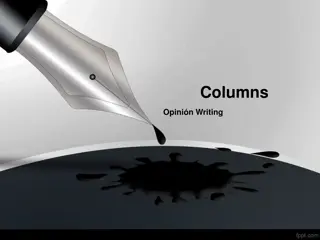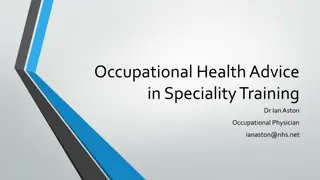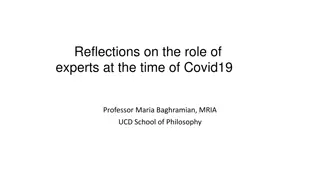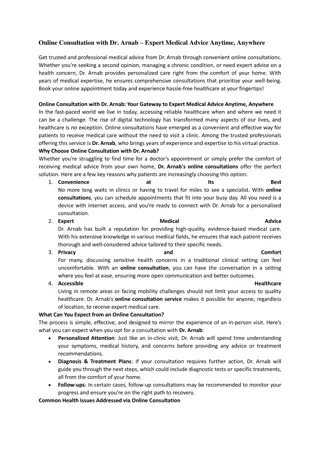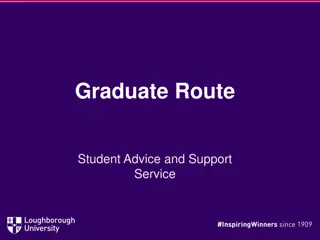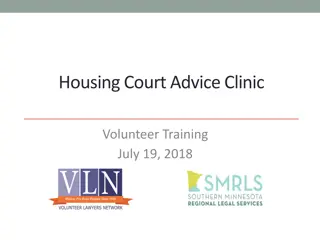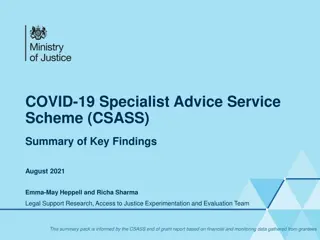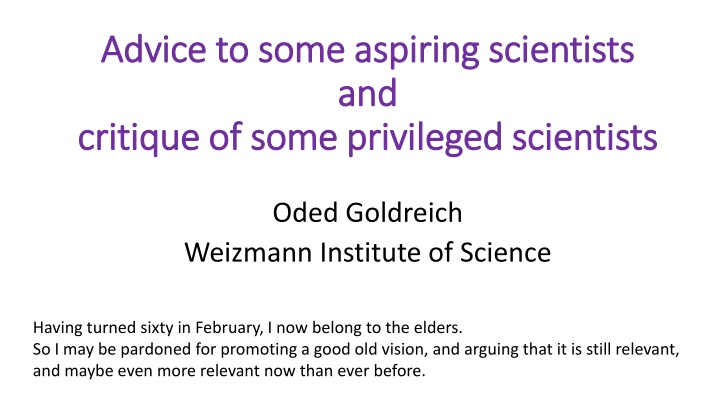
Advice and Critique for Aspiring Scientists by Oded Goldreich
Discover valuable advice for aspiring scientists from Oded Goldreich, a renowned scientist at the Weizmann Institute of Science, as he reflects on the importance of commitment to science and critiques privileged scientists who may lack true dedication. Explore the contrast between careerism and the vocation of science to understand the deeper significance of pursuing scientific endeavors.
Download Presentation

Please find below an Image/Link to download the presentation.
The content on the website is provided AS IS for your information and personal use only. It may not be sold, licensed, or shared on other websites without obtaining consent from the author. If you encounter any issues during the download, it is possible that the publisher has removed the file from their server.
You are allowed to download the files provided on this website for personal or commercial use, subject to the condition that they are used lawfully. All files are the property of their respective owners.
The content on the website is provided AS IS for your information and personal use only. It may not be sold, licensed, or shared on other websites without obtaining consent from the author.
E N D
Presentation Transcript
Advice Advice to some aspiring scientists to some aspiring scientists and and critique of some privileged critique of some privileged scientists scientists Oded Goldreich Weizmann Institute of Science Having turned sixty in February, I now belong to the elders. So I may be pardoned for promoting a good old vision, and arguing that it is still relevant, and maybe even more relevant now than ever before.
A general comment about advice I don t really believe in generic advice. A good advice should be tailored to the personality of the advisee. So I guess the following advice is suitable for people who are somewhat similar to me, at least in some relevant aspects. In short, you should take the following advice only if you feel that it empowers you; otherwise ignore it.
Advice to Advice to some some aspiring (i.e., non aspiring (i.e., non- -tenured) scientists tenured) scientists For starters: Don t be humbled by past research, let alone researchers. On myself (Part 1): Proof of immodesty. On myself (Part 2): Lacking extraordinary skills of any type. Possessing and guided by good attitudes towards research. Good attitudes can be learned, adopted, and internalized. The main attitude: A commitment to Science. It is not a sacrifice (to some transcendental God) but a life choice. Submitting to it is being true to yourself (your choice). Betraying it for temporal benefits is pathetic. 3. knowing a specific natural language (e.g., English), 4. knowingno language. Conclusion: Take yourself (and your research) seriously, adopt a commitment towards science. Re the gap in skills. Consider: 1. creating a scientific work (e.g., one presented in STOC'17), 2. understanding such a work (when clearly presented),
Critique of Critique of some some privileged (i.e., tenured) scientists privileged (i.e., tenured) scientists Failing to materialize the commitment to Science. E.g., superficial reviews and evaluations. (See details below.) The duty of the privileged: Serve the scientific aspirations (esp., of the less privileged). Superficial reviews: Some underlying bad attitudes: Insisting on applications (to practice, to theory). Referring to what is missing rather to what is present. Confusing what is obvious a posteriori with the a priori. Complaining that proofs are elementary, and have no new ideas. In general, not listening, rushing to grade. Superficial evaluations: Reduction to content-oblivious measures.
Careerism vs the Vocation of Science Careerism vs the Vocation of Science Careerism = Focus on personal benefits (obtained by doing research). Kant (2nd formulation of the categorical imperative, 1785). Act in such a way that you treat humanity, whether in your own person or in the person of any other, never merely as a means to an end, but always at the same time as an end. Max Weber (Science as a Vocation, 1919). While focusing on one's career may generate some temporal benefits, it cannot generate true Science. Thus, in the long term, careerism will even fail to serve the careerist. Needless to say, it will always fail to give a feeling of responding to the vocation of Science, which means that the careerist is doomed to a meaningless pursuit. Such a person will be better off selecting less frustrating careers, since a "scientific career" is worthy its frustration only when the vocation of Science is present in it. MacIntyre (After Virtue, Chap. 14 ( the nature of the virtues ), 1981). External goods = contingently attached to the research activity by social circumstance; such goods include prestige, status and money. Can be obtain in alternative ways. Internal goods = can be obtained only by performing research, can only be specified in terms of the research activity itself and by means of examples from this activity, and can only be identified and recognized by the experience of participating in the activity in question. When external goods are achieved, they are always some individual's property and possession. Moreover, typically, the more someone has of them, the less there is for others. Hence, they are typically objects of competition in which there must be losers as well as winners. Internal goods are indeed the outcome of competition to excel, but it is characteristic of them that their achievement is a good for the whole community that participates in the activity.
Surviving bad times: The community and Society at large Surviving bad times: The community and Society at large The sour state of affairs reflected in careerism is part of the Zeitgeist. Vulgar individualism (vs human as a social creature). Elimination of meaning (vs the human need for meaning [V. Frankl]). (Related: meaning arises in interaction within a community.) A small community (e.g., the ToC community) can resist the fate of society at large and create an island of meaning and social solidarity. *) Vulgar individualism = the fantasy of fully autonomous humans.
External and Internal Goods in Scientific research External and Internal Goods in Scientific research There are two kinds of good possibly to be gained by excelling in the research activity. On the one hand, there are those goods externally and contingently attached to this activity by the accidents of social circumstance; such goods as prestige, status and money. There are always alternative ways for achieving such goods, and their achievement is never to be had only by engaging in research. On the other hand, there are the goods internal to the research activity which cannot be had in any way but by performing research. We call them internal for two reasons: first, because we can only specify them in terms of the research activity itself and by means of examples from this activity (otherwise the meagerness of our vocabulary for speaking of such goods forces us into such devices as talking of 'a certain highly particular kind of'); and, secondly, because they can only be identified and recognized by the experience of participating in the activity in question. Those who lack the relevant experience are incompetent thereby as judges of internal goods. We are now in a position to notice an important difference between internal and external goods. It is characteristic of what is called external goods that when achieved they are always some individual's property and possession. Moreover characteristically they are such that the more someone has of them, the less there is for other people. This is sometimes necessarily the case, as with power and fame, and sometimes the case by reason of contingent circumstance as with money. External goods are therefore characteristically objects of competition in which there must be losers as well as winners. Internal goods are indeed the outcome of competition to excel, but it is characteristic of them that their achievement is a good for the whole community who participate in the activity.













